Geoff Brash IELTS Reading Answers
5 min read
Updated On
-
Copy link
Table of Contents

Limited-Time Offer : Access a FREE 10-Day IELTS Study Plan!
The Academic passage ‘Geoff Brash‘ is a reading passage that appeared in an IELTS Test. Try to find the answers to get an idea of the difficulty level of the passages in the actual reading test. If you want more passages to solve, try taking one of our IELTS reading practice tests.
Geoff Brash
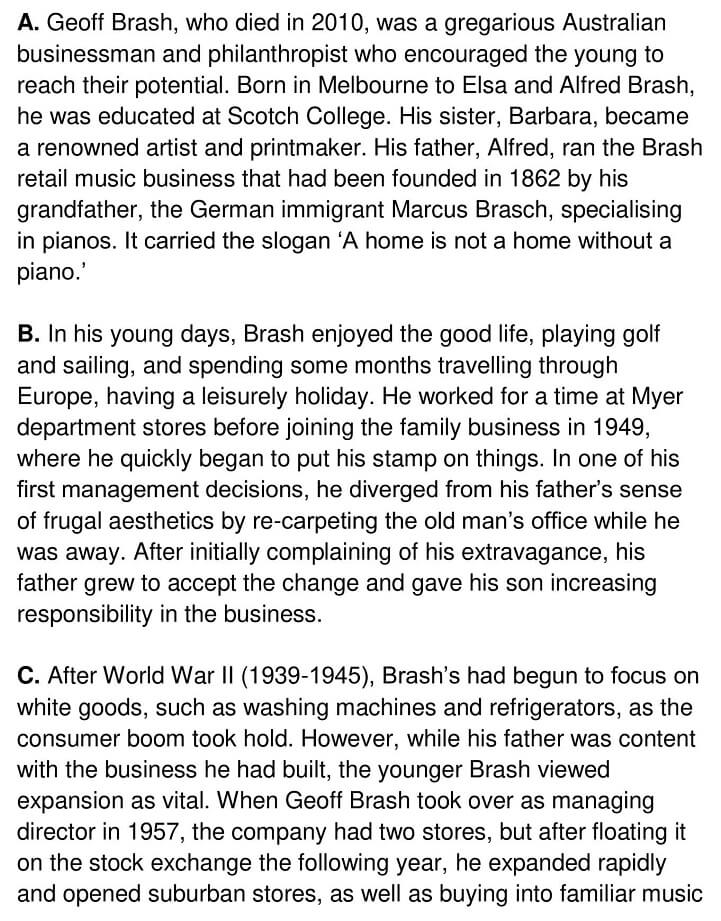
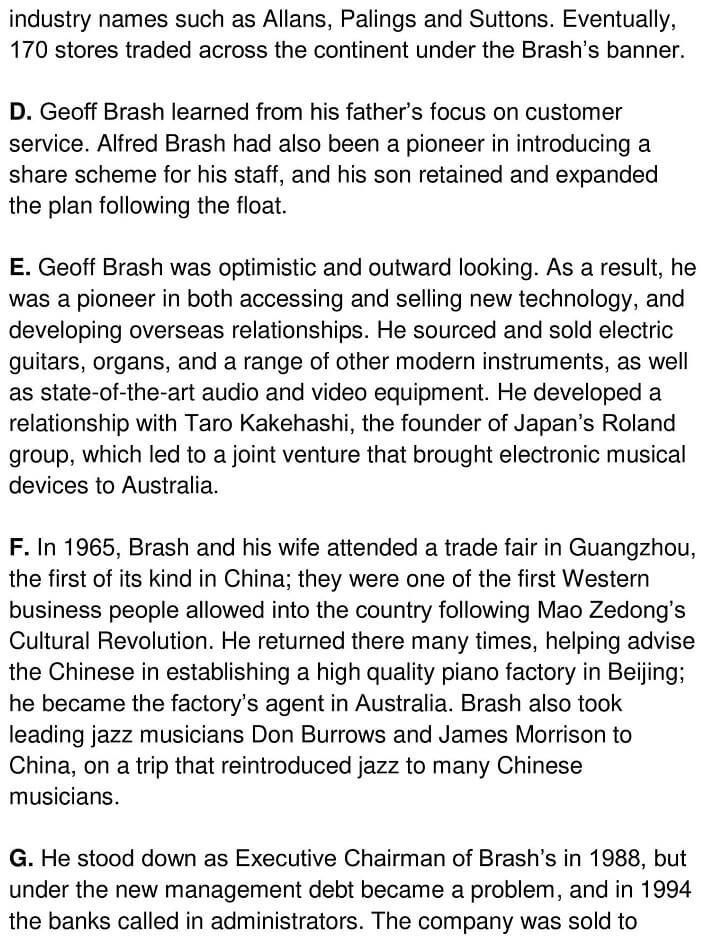
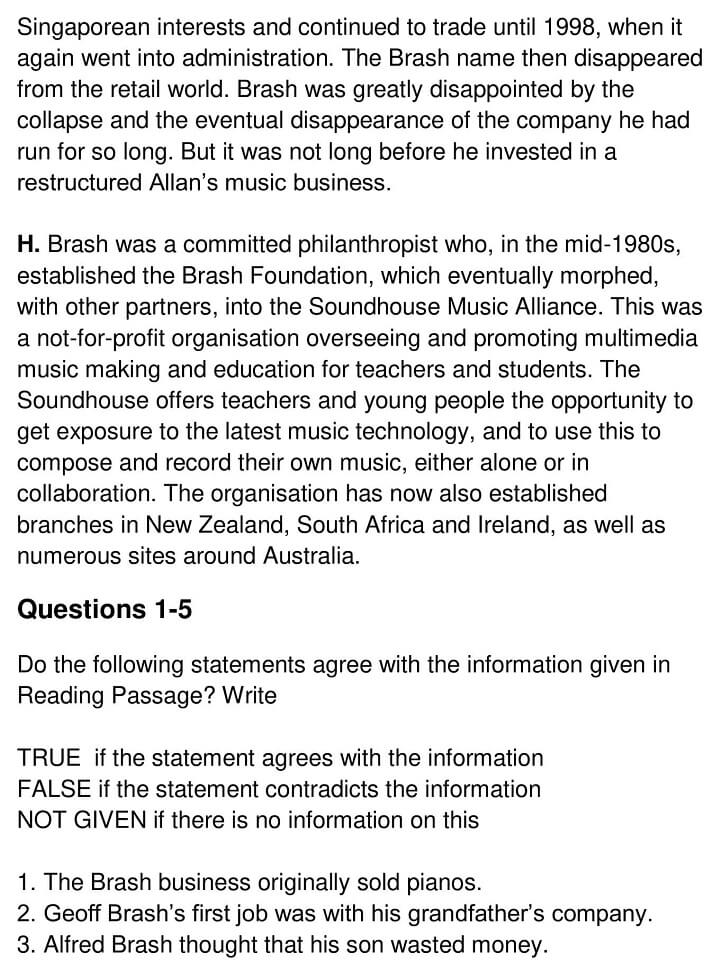
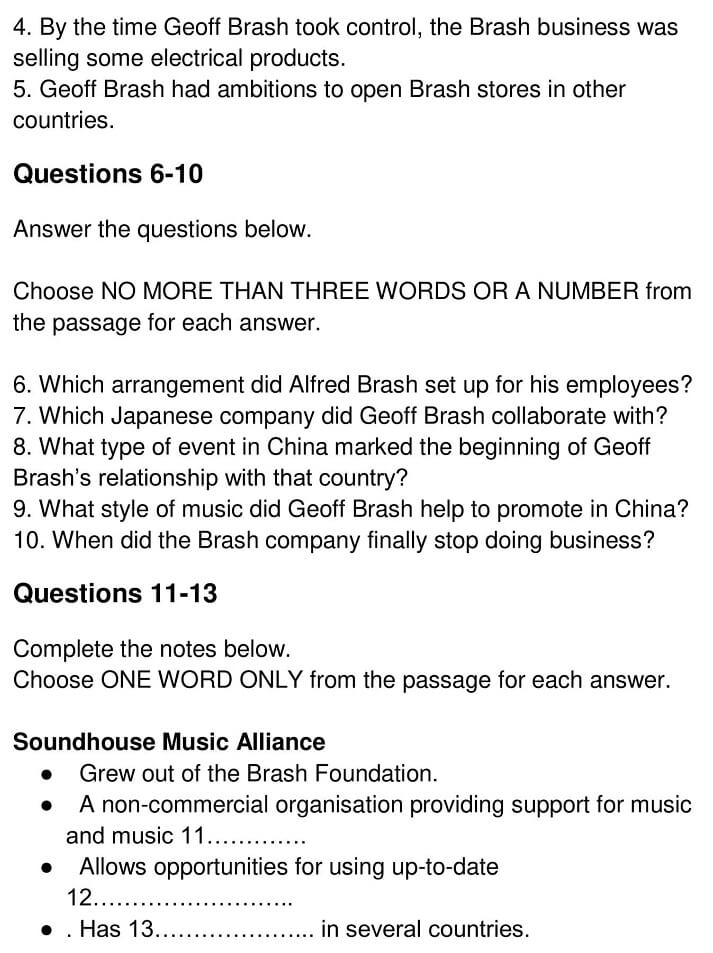
Answers
| Question number | Answer | Explanation |
|---|---|---|
| 1 | TRUE | Paragraph A informs that Geoff Brash’s father, Alfred, ran the Brash retail music business that had been founded in 1862 by his grandfather, the German immigrant Marcus Brasch, specialising in pianos. Therefore, it means that the Brash family business, started by Marcus Brasch, sold pianos. As the statement agrees with the information, the answer is TRUE. |
| 2 | FALSE | Paragraph B refers to the fact that Brash worked for a time at Myer department stores before joining the family business in 1949 where he quickly began to put his stamp on things. So, his first job was at Myer department stores and not with his grandfather’s company. As the statement contradicts the information, the answer is FALSE. |
| 3 | TRUE | The concluding sentence of paragraph B points out that after initially complaining of his extravagance (wastage of money), his father, Albert Brash, grew to accept the change and gave his son increasing responsibility in the business. So, in the beginning, Alfred Brash thought that his son wasted money, but gradually accepted the change. As the statement agrees with the information, the answer is TRUE. |
Unlock Answers
| 4 | TRUE | Paragraph C mentions that after World War II (1939-1945), Brash’s had begun to focus on white goods, such as washing machines and refrigerators, as the consumer boom took hold (the Brash business was selling some electrical products). When Geoff Brash took over as managing director in 1957, the company had two stores, but after floating it on the stock exchange the following year, he expanded rapidly and opened suburban stores, as well as buying into familiar music industry names such as Allans, Palings and Suttons. Therefore, when Brash started taking interest, the company improved more. As the statement agrees with the information, the answer is TRUE. |
| 5 | NOT GIVEN | In the last sentence of paragraph C, it is given that eventually, 170 stores traded across the continent under the Brash’s banner. Later, in paragraph E, the author writes that he was a pioneer in both accessing and selling new technology, and developing overseas relationships. He sourced and sold electric guitars, organs, and a range of other modern instruments, as well as state-of-the-art audio and video equipment. Although information is given that he gradually expanded his business to other countries, there is no direct reference that Geoff Brash had ambitions to open Brash stores in other countries. Hence, the answer is NOT GIVEN. |
| 6 | (a) share scheme | Paragraph D brings out the fact that Geoff Brash learned from his father’s focus on customer service. Alfred Brash had also been a pioneer, that is, he was among the first to introduce a share scheme for his staff, and his son retained and expanded the plan following the float. Hence, the answer is ‘(a) share scheme’. |
| 7 | Roland/ Roland group/ the Roland group | Paragraph E communicates that Geoff Brash developed a relationship with (collaborated with) Taro Kakehashi, the founder of Japan’s Roland group (the Japanese company). Hence, the answer is ‘Roland/ Roland group/ the Roland group’. |
| 8 | (a) trade fair | Paragraph F indicates that in 1965, Brash and his wife attended a trade fair in Guangzhou, the first of its kind in China; they were one of the first Western business people allowed into the country following Mao Zedong’s Cultural Revolution. This event in China marked the beginning of Geoff Brash’s relationship with that country. Hence, the answer is ‘(a) trade fair’. |
| 9 | jazz | Paragraph F states Brash also took leading jazz musicians Don Burrows and James Morrison to China, on a trip that reintroduced jazz to many Chinese musicians. So, he promoted jazz in China. Hence, the answer is ‘jazz’. |
| 10 | 1998 | Paragraph G lets out that Brash stood down as Executive Chairman of Brash’s in 1988, but under the new management debt became a problem, and in 1994 the banks called in administrators. The company was sold to Singaporean interests and continued to trade until 1998, when it again went into administration. The Brash name then disappeared from the retail world. So, in the year 1998, the Brash company finally stopped doing business. Hence, the answer is ‘1998’. |
| 11 | education | Paragraph H relates that the Brash Foundation, which eventually morphed into the Soundhouse Music Alliance. This was a not-for-profit organisation overseeing and promoting multimedia music making and education for teachers and students. So, the Soundhouse Music Alliance provided support for music and music education. Hence, the answer is ‘education’. |
| 12 | technology | Paragraph H declares that the Soundhouse offers teachers and young people the opportunity to get exposure (allows opportunities) to the latest (up-to-date) music technology, and to use this technology to compose and record their own music, either alone or in collaboration. Hence, the answer is ‘technology’. |
| 13 | branches | Paragraph H made known the fact that the organisation (The Soundhouse) has now also established branches in New Zealand, South Africa and Ireland, as well as numerous sites around Australia. As it is clear that the not-for-profit organisation established branches in many countries like New Zealand, South Africa, Australia and others, the answer is ‘branches’. |
Check More IELTS Reading Answers
| Obtaining Linguistic Data Answers | Obtaining Linguistic Data Answers |
| Odonata Reading Answers | Glaciers Reading Answers |
| Indoor Pollution Reading Answers | Micro Enterprise Credit For Street Youth Answers |
Also check :
Practice IELTS Reading based on question types

Start Preparing for IELTS: Get Your 10-Day Study Plan Today!
Recent Articles

Nehasri Ravishenbagam

Haniya Yashfeen

Haniya Yashfeen

Haniya Yashfeen
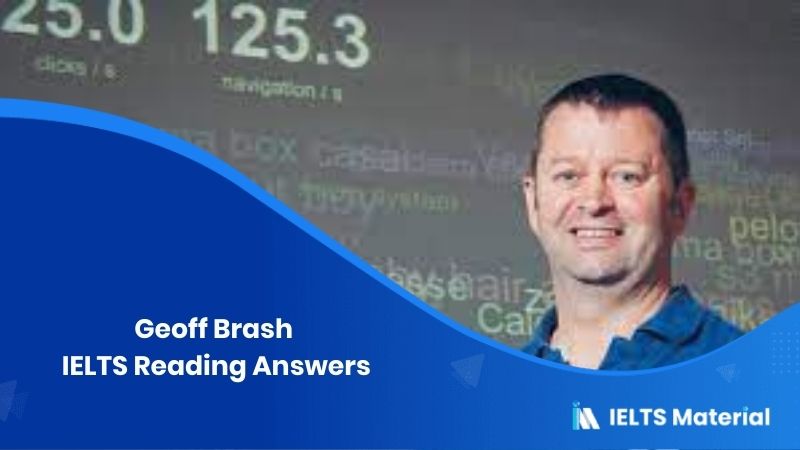



Post your Comments